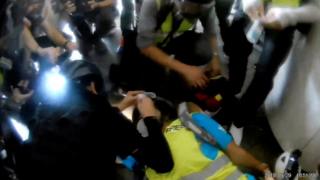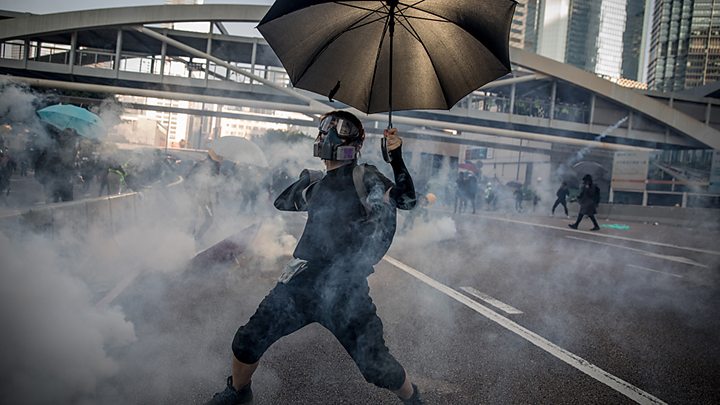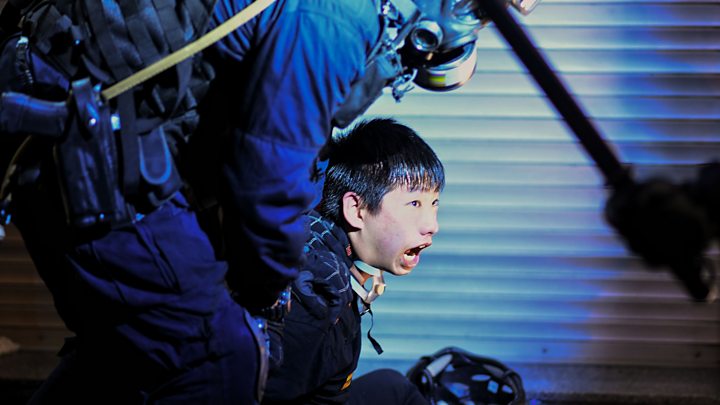HK rubber bullet blinds journalist in one eye
An Indonesian journalist has been left permanently blinded in her right eye by a rubber bullet said to have been fired by police during unrest in Hong Kong.
Veby Mega Indah was covering protests in the Chinese territory on Sunday when the bullet hit protective glasses she was wearing, her lawyer says.
Months of anti-government unrest took a more violent turn on Tuesday when a police bullet injured a protester.
Feeling ran high as mainland China celebrated 70 years of Communist rule.
Protesters – some armed with poles, petrol bombs and other projectiles – fought pitched battles with police in several parts of Hong Kong.
In all, police made 269 arrests, more than on any day since protests began. More than 100 people were taken to hospital and 30 police were injured.
Tuesday’s unrest saw police fire 900 rubber bullets and 1,400 rounds of tear gas. That compares with 1,000 tear gas canisters fired in the first two months of protests.
How was the journalist hurt?
Video of Sunday’s incident shows the rubber bullet being fired at a group of protesters and journalists on a footbridge in the city’s Wan Chai area.
The round hit her glasses from a range of 12 metres (40ft), injuring both her eyes, said lawyer Michael Vidler.
She was taken to hospital where, on Wednesday, doctors confirmed she would be permanently blind in one eye.
The journalist, who works for Indonesian-language newspaper Suara, had been wearing a high-visibility vest and helmet marked “press”.
She was later quoted as saying another journalist had shouted “Don’t shoot, we’re journalists” just before she was shot.
Confirming the journalist had been hurt, Indonesia’s consulate general in Hong Kong urged its citizens to avoid Wan Chai and other areas caught up in the unrest.
Anis Hidayah, director of the Migrant Care non-governmental organisation, said Hong Kong’s government should take responsibility for the incident.
“The Indonesian government through the Consulate General in Hong Kong should take swift action to investigate this,” she told The Jakarta Post.
On Wednesday, demonstrators in Hong Kong held a march to protest against what they say is the police’s excessive use of force.
Why has the unrest got so violent?
The protests were sparked earlier this year by a proposed law, which would have allowed extradition from Hong Kong to the Chinese mainland.
Opponents thought this would put Hong Kongers at risk of unfair trials, and, in July, Hong Kong leader Carrie Lam said the law “was dead”.
But despite the law being withdrawn, the protests have continued every weekend.
Clashes between police and protesters have created their own momentum, and there is wider discontent too.
Recent years have seen growing opposition to the perceived encroachment of Beijing on Hong Kong’s politics and threats to local identity.
Many young people have economic worries, and there are also demands for universal suffrage for elections to Hong Kong’s parliament.
What is the background?
Until 1997, Hong Kong was a British territory. Since then, it has been part of China but with its own system of law and government – known as One Country, Two Systems.
Hong Kong has its own judiciary and a separate legal system. Rights including freedom of assembly and freedom of speech are protected.
But those freedoms – the Basic Law – expire in 2047. It is not clear what Hong Kong’s status will be then.
Source: Read Full Article





